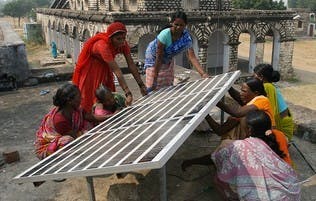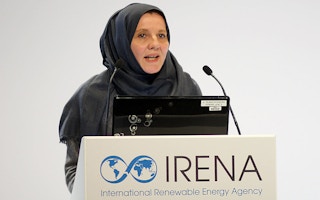Most jobs in the renewable energy sector are handled by men, but there is huge potential in women playing a bigger role in this growing sector, says International Renewable Energy Agency (IRENA) senior policy advisor Rabia Ferroukhi.
Ferroukhi is one of the main authors of a report titled ‘Renewable Energy and Jobs’ released by the intergovernmental agency earlier this year - the first global report of its kind. Women, who make up 70 per cent of the world’s 1.3 billion people in extreme poverty, can benefit from the projected 16.7 million jobs in the renewable energy sector by 2030, she noted.
Ferroukhi, who has enjoyed an illustrious 20-year career in the fields of energy, development and the environment, is herself a vocal advocate for more female participation in the sector.
Currently, she leads IRENA’s policy team, looking at how renewable energy plans are designed and how these can be integrated into government energy policies. She is also the acting director for the knowledge, policy and finance division of the Abu Dhabi-based agency.
She has worked with governments in the Middle East and North Africa, including the Ministry of Foreign Affairs in the UAE and the Qatar Environment and Energy Research Institute, as well as with energy companies in the Mediterranean and in the Gulf Cooperation Council countries.
In this interview, Ferroukhi speaks to Eco-Business about what governments and businesses can do to create more jobs and attract talent to the sector, especially in providing equal opportunities for both men and women.
What inspires you to work in renewable energy?
The future of our planet and that of future generations – it is difficult to look at changes taking place on our planet today and not feel concerned. We all agree that transformation is needed in how energy is produced and consumed in order to reduce the negative environmental, social and economic impacts. We should all look at areas where we can contribute.
Energy is very important in economic development, and I believe supporting nations in implementing policies that promote cleaner forms of energy can lead us to a more sustainable development path.
What are some key issues that need to be addressed to encourage more women in the sector?
While preparing the Renewable Energy and Jobs report, our analysis revealed that what hinders women’s participation in the renewable energy sector are self-perceptions about working as engineers or in other technical jobs, which are still mostly dominated by men.
“
Including gender in the employment analysis can be instrumental in guiding policy design towards promoting equal opportunities within the sector. In the coming years, IRENA will continue its endeavour in introducing the gender dimension of employment as an integral element of the mainstream discussions surrounding renewable energy adoption
Rabia Ferroukhi, acting director for the knowledge, policy and finance division, IRENA
Outside of that, women are limited by their mobility to take up jobs where they have to travel or relocate for a longer period, as locations of large renewable energy construction projects are often in remote areas. This is especially disadvantageous for women, many of whom are expected to remain traditionally tied to responsibilities at home.
Another thing is the lack of access to basic education and training. Statistics in the report revealed that women enrollment in science and technology programmes are still lagging. Addressing these barriers at the national and local levels is essential to increasing women’s participation in the sector, which in turn will expand the pool of talent and meet the skills needed in this growing industry.
The lack of access to energy sources is cited as one of the reasons contributing to gender inequity, especially in developing countries. How can renewable energy help in this respect?
Renewable energy provides opportunities to improve gender equity. First, the use of renewable energy technology can reduce the long hours spent on collecting fuelwood. This gives women the time to pursue education and employment opportunities.
Second, women are more prone to illness due to indoor air pollution from household solid fuel use. Using modern cook stoves can help greatly reduce the risk of respiratory diseases.
Third and most importantly, renewable energy deployment presents many employment opportunities for women, as well as the chance to become entrepreneurs and run their own businesses, such as the case of the ‘Solar Sister’ in rural sub-Saharan Africa.
This pilot project which started in Kampala, Uganda in 2010 had only two women initially trained as solar entrepreneurs to sell portable solar lights. In 2013, this number has grown to 315 and has expanded to Rwanda and southern Sudan. These women are the primary managers of household energy needs, so their direct involvement in selling the product was found to be the most effective solution. The income-generating activities help poor women to work their way out of poverty and help further empower them.
What are some good examples of initiatives or policies that can help women become key players in the renewable energy sector?
We are already seeing several initiatives in some countries such as India, Kenya and Senegal, which have undertaken gender audits of their energy sector to identify whether gender is mainstreamed, or how it can be mainstreamed, into public policy. (Gender mainstreaming involves assessing the different implications for women and men of any planned policy action.)

India’s rural women are trained at Barefoot College to install solar panels for electrification. Image: Barefoot College
Along the same lines, a recent resolution by the European Parliament concerning jobs in a sustainable economy called upon governments to promote equal participation and terms for both men and women in the labour market.
Governments can also play an important role in promoting gender equality through policies that target the development of skills. This includes identifying and providing training for skills needed by both women and men, attracting female students into the STEM (Science, Technology, Engineering and Mathematics) education fields, and ensuring that opportunities are equally accessible to both genders.
One example of women’s participation in the STEM fields is the Clean Energy Education and Empowerment initiative which has Australia, Denmark, Mexico, the United Arab Emirates, the United States, among others, as its active participants.
Another important initiative is providing adequate training or vocational apprenticeship programmes. In the EU, the European Social Fund is dedicated to financing training projects in several areas, including renewable energy, and it ensures that its programmes attract and integrate women and men equally.
The case of Solar Sister in Sub-Saharan Africa or Barefoot College in India (which provides solar installation training for rural women) also amply demonstrate the vital role that women entrepreneurs can play in the production, installation and operations and maintenance of renewable energy systems, including managing these systems as entrepreneurs.
Is there a Western-Eastern divide when it comes to women leadership in this sector? What factors enable these women to succeed in this field and what can be improved to allow more women to have such opportunities?
There are numerous success stories of women leadership in renewable energy and it is not necessarily divided between the developed and developing world. We see women in leadership roles in different countries and cultures.
Among the factors that enable women to succeed in the field are regulations promoting gender mainstreaming; available access to assets, finance and training; and, no gender discrimination during recruitment.
However, there are areas for improvement. One would be to integrate gender roles while making policies and crafting renewable energy programmes to ensure they consider how both men and women can equally contribute to the development of the industry.
Gender mainstreaming can be done at different levels of policy, programme or project, including at the organisational level, to ensure the challenges that women face in the industry are addressed. Most importantly, the participation of women is increased when they have access to the appropriate education and training.
The report cited some studies that say women in the boardroom tend to favour clean energy solutions and vote for projects that support renewable energy. Why do you think this is so?
Several studies have documented differences in the perspectives men and women have with respect to the energy sector, including renewable energy. But what is important is to recognise the value brought in by both genders equally for their similarities as well as their differences - and how their diverse roles facilitate renewable energy deployment.
For instance, in the case of renewable energy access in developing countries, women in homes or those working in small enterprises in small communities play a big role. In such cases, including the gender dimension in renewable energy strategies can help improve the effectiveness of the programme. It taps women’s participation and capacity to deliver what is needed by the community to improve livelihoods by providing them clean and sustainable energy services.
You have been working on energy and climate change issues for over 20 years, primarily in the Middle East, which is a major energy exporter. What are the major changes that have taken place since then and can you share with us some of your experiences?
Over the years, I have worked on various projects with a special emphasis on the political economy of sustainable development and renewable energy sources. In the regional context, these projects directly tackle some of the pressing issues faced by different governments and relevant stakeholders in energy efficiency, renewable energy and climate change-related projects under the Kyoto Protocol’s Clean Development Mechanism.
“
Among the factors that enable women to succeed in the field are regulations promoting gender mainstreaming; available access to assets, finance and training; and, having no gender discrimination during recruitment
Rabia Ferroukhi
The region has shown increased commitment to these issues, including the recent deployment of renewable energy. Most countries have announced renewable energy targets, which are mainly dominated by solar energy, which has tremendous potential in the region.
In the GCC countries, the UAE and Saudi Arabia have launched the development of landmark projects both at the domestic and international level in the solar industry. In order to adapt technologies to local requirements, research and development institutes have also been established in most countries. In addition, some countries in the GCC such as Qatar and Saudi Arabia have invested in the manufacturing of solar energy equipment.
As senior policy advisor at IRENA, what role do you think can the organisation play in providing equal opportunities in the sector?
IRENA works closely with its member states in developing enabling policy frameworks that allow for accelerated renewable energy deployment while also maximising the socio-economic benefits.
Through its activities, IRENA informs gender-sensitive policy-making through studies such as those recorded in the Renewable Energy and Jobs report that focus on bridging the existing knowledge gap in renewable energy employment data.
Including gender in the employment analysis can be instrumental in guiding policy design towards promoting equal opportunities within the sector. In the coming years, IRENA will continue its endeavour in introducing the gender dimension of employment as an integral element of the mainstream discussions surrounding renewable energy adoption.
To learn more about women’s leadership, the United Arab Emirates is hosting the 16th Global Edition of the Women in Leadership Economic Forum, under the patronage of the Ministry of Economy United Arab Emirates.
The event will be held on 19-20 November 2014 in Dubai, featuring 300 of the most influential business and thought leaders from across the globe to discuss key issues on women in leadership.











